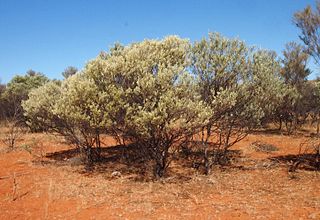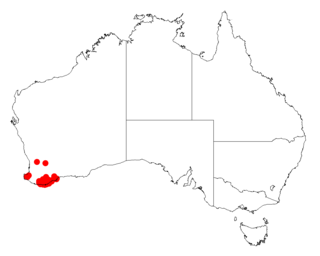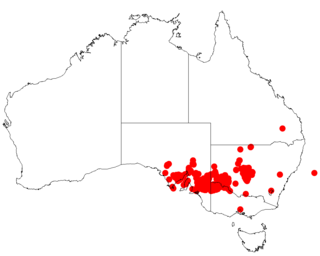
Acacia cuthbertsonii is a perennial shrub or tree native to arid parts of inland and north western Australia.

Acacia deanei is a tree native to Australia, which is useful for controlling soil erosion. There are two subspecies: Acacia deanei subsp. deanei and Acacia deanei subsp. paucijuga.

Acacia effusifolia is a shrub or tree belonging to the genus Acacia and the subgenus Juliflorae. It is native to an area in the Mid West and the Wheatbelt regions of Western Australia.

Acacia repanda is a shrub belonging to the genus Acacia and the subgenus Juliflorae that is endemic to a small area in western Australia.

Acacia cedroides is a shrub belonging to the genus Acacia and the subgenus Phyllodineae that is endemic to Western Australia.

Acacia cupularis, commonly known as the Coastal Umbrella Bush, is a shrub belonging to the genus Acacia and the subgenus Phyllodineae that is endemic to southern parts of Australia.

Acacia gonophylla, also known as rasp-stemmed wattle, is a shrub belonging to the genus Acacia and the subgenus Phyllodineae that is endemic to south western parts of Australia.

Acacia ingrata is a shrub belonging to the genus Acacia and the subgenus Phyllodineae that is endemic to south western Australia.

Acacia mutabilis is a shrub belonging to the genus Acacia and the subgenus Phyllodineae that is endemic to south western Australia.

Acacia nigripilosa is a shrub belonging to the genus Acacia and the subgenus Phyllodineae that is endemic to Western Australia.

Acacia obovata is a shrub belonging to the genus Acacia and the subgenus Phyllodineae that is endemic to south western Australia.

Acacia sphacelata is a shrub of the genus Acacia and the subgenus Phyllodineae that is endemic to south western Australia.

Acacia squamata is a shrub of the genus Acacia and the subgenus Phyllodineae that is endemic to south western Australia.

Acacia depressa, also commonly known as echidna wattle, is a shrub of the genus Acacia and the subgenus Pulchellae that is endemic to south western Australia. It was listed as vulnerable according the Environment Protection and Biodiversity Conservation Act 1999 in 2007.

Acacia drewiana is a shrub of the genus Acacia and the subgenus Pulchellae that is endemic to an area of south western Australia.

Acacia empelioclada is a shrub of the genus Acacia and the subgenus Pulchellae that is endemic to an area along the south coast of south western Australia.

Acacia luteola is a shrub of the genus Acacia and the subgenus Pulchellae that is endemic to an area of south west Australia.

Acacia parvipinnula, commonly known as silver-stemmed wattle, is a species of Acacia native to eastern Australia.

Acacia wilhelmiana, commonly known as dwarf nealie, Wilhelmi’s wattle and mist wattle, is a shrub belonging to the genus Acacia and the subgenus Plurinerves native to the mallee region of central and eastern Australia.

Acacia resinicostata is a shrub belonging to the genus Acacia and the subgenus Phyllodineae native to north eastern Australia.




















